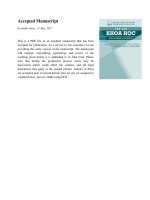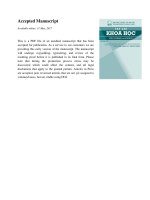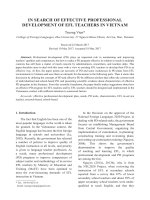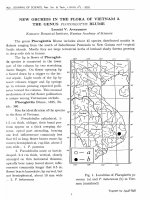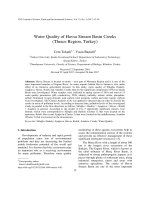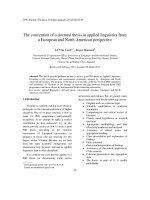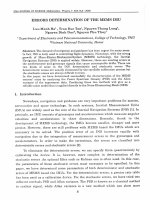DSpace at VNU: New deformation of para-Bose statistics
Bạn đang xem bản rút gọn của tài liệu. Xem và tải ngay bản đầy đủ của tài liệu tại đây (34.82 KB, 6 trang )
P1: FYJ
International Journal of Theoretical Physics [ijtp]
pp975-ijtp-472197
October 6, 2003
19:23
Style file version May 30th, 2002
International Journal of Theoretical Physics, Vol. 42, No. 8, August 2003 ( C 2003)
New Deformation of Para-Bose Statistics
Cao Thi Vi Ba,1 Ha Huy Bang,1,3 and Dang Van Soa2
Received July 5, 2002
We propose commutation relations for a single mode gˆ -deformed para-Bose oscillator.
In this new deformation of para-Bose statistics the distribution function has the same
form as in the para-Bose statistics. Furthermore, we show analogies between the coherent
states of gˆ -deformed and q-deformed para-Bose statistics.
KEY WORDS: deformation; para-Bose statistics.
1. INTRODUCTION
Recently much effort has been devoted to the study of deformed structures,
both in the context of quantum group and of Lie-admissible algebras. It is known
that the concept of intermediate statistics is not new, it dates back to the 1950s.
Since the work by Wilczek (1982a,b), it has been studied extensively and was
found to be useful to study fractional quantum Hall effect (Halperin, 1984) and
superconductivity (Langhlin, 1988).
One of the possible approaches to intermediate statistics consists in deforming
the bilinear Bose and Fermi commutation relations. Particles which obey this
type of statistics are called quons (Greenberg, 1991). If we consider a system
with a single degree of freedom, we obtain the relation aa + − qa + a = 1, i.e.,
the q-oscillators. It was first introduced by Arik and Coon (1976) and Kuryshkin
(1980), and later rediscovered in the context of quantum SU (2) (Biedenharn, 1989;
Macfarlane, 1989; Woronowicz, 1987). Recently, a version of fractional statistics
has been proposed which possesses some operational characteristies. In this type
of approach, the c-number q which appears in the q-deformed algebras is replaced
by an operator gˆ which gives the generalized statistics interesting properties (De
Falco et al., 1995a,b,c; De Falco and Mignani, 1996; Scipioni, 1993a,b, 1994; Wu
et al., 1992; Zhao et al., 1995).
1 Department
of Physics, Vietnam National University, Hanoi, Vietnam.
of Physics, Hanoi University of Education, Vietnam.
3 To whom correspondence should be addressed at Department of Physics, Vietnam National University,
334 Nguyen Trai, Hanoi, Vietnam.
2 Department
1781
0020-7748/03/0800-1781/0
C
2003 Plenum Publishing Corporation
P1: FYJ
International Journal of Theoretical Physics [ijtp]
pp975-ijtp-472197
October 6, 2003
1782
19:23
Style file version May 30th, 2002
Ba, Bang, and Soa
It is known (Green, 1953; Greenberg, 1990; Ohnuki and Kamefuchi, 1982)
that besides the ordinary Bose and Fermi statistics there exist their para-Bose and
para-Fermi generalizations. Chaturvedi and Srinivasan (1991) showed that a single
para-Bose oscillator may be regarded as a deformed Bose oscillator. The commutation relations (CR) for a single mode of the harmonic oscillator which contains
para-Bose and q-deformed oscillator CR are constructed (Krishma Kumari, 1992).
Next, the connection of q-deformed and generalized deformed para-Bose oscillators with para-Bose oscillators has been determined (Bang, 1994, 1996), and some
properties of the deformed para-Bose systems have also been considered (Bang,
1995a,b; Bang and Mansur Chowdhury, 1997; Chakrabarti and Jagannathan, 1994;
Shanta et al., 1994).
Naturally, the following question can be raised: how can the gˆ -deformed
commutation relations for a single-mode para-Bose oscillator be generalized in
the case of gˆ -deformation.
The main purpose of this work is devoted to this question. In addition, we discuss the distribution function and the coherent states of the annihilation operators
corresponding to gˆ -deformed para-Bose oscillators.
2. gˆ -DEFORMED PARA-BOSE OSCILLATORS
As is well known, a single mode para-Bose system (Bang, 1996; Chaturvedi
and Srinisavan, 1991) is characterized by the CR
[a, N ] = a,
[a + , N ] = −a +
(1)
where
N =
1
p
(aa + + a + a) =
2
2
(2)
and p is the order of the para-Bose system. Also
aa + = f (N + 1),
a + a = f (N )
(3)
1
f (n) = n + {1 − (−1)n }( p − 1).
2
(4)
[a, a + ] = g(N )
(5)
g(N ) = f (N + 1) − f (N ) = 1 + (−1)N ( p − 1).
(6)
with
Hence
where
P1: FYJ
International Journal of Theoretical Physics [ijtp]
pp975-ijtp-472197
October 6, 2003
19:23
New Deformation of Para-Bose Statistics
Style file version May 30th, 2002
1783
From these relations, an operator A+ was constructed so that (Chaturvedi and
Srinisavan, 1991; Krishma Kumari et al., 1992)
A+ = a +
[a · A+ ] = 1,
N +1
f (N + 1)
(7)
[A+ , N ] = −A+ .
(8)
By the results just mentioned the number operator N can be written as
N = A+ a.
(9)
Let us now turn to the question of the gˆ -deformed para-Bose oscillator. According
to the method in Krishma Kumari et al. (1992) we can gˆ -deform the para-Bose
CR namely by proposing the CR to be
+
+
a˜ A˜ g − gˆ A˜ g a˜ = 1,
(10)
a˜ + (N + 1)
+
,
A˜ g =
f (N + 1)
(11)
˜+
where A
g and N are given by
+
˜
N = A˜ g a.
(12)
By using (11) and (12) we obtain
a˜ + a˜ = f (N ),
a˜ a˜ + = (gˆ N + 1)
(13)
f (N + 1)
.
N +1
(14)
With the help of (13) and (14) we get
˜ a˜ + ] = f (N + 1) − f (N ) + oˆ
[a,
N
f (N + 1)
N +1
≡ h(N ),
(15)
where
oˆ = gˆ − 1.
(16)
In so doing, we are led to the CR for gˆ -deformed para-Bose oscillators.
3. STATISTICAL DISTRIBUTION
Consider now the gˆ -deformed Green function defined as the statistical distri˜ The statistical distribution of the operator F is defined through the
bution of a˜ + a.
P1: FYJ
International Journal of Theoretical Physics [ijtp]
pp975-ijtp-472197
October 6, 2003
1784
19:23
Style file version May 30th, 2002
Ba, Bang, and Soa
formula:
1
tr(e−fl H F),
Z
F =
(17)
where Z is the partition function,
Z = tr(e−fl H ),
(18)
1
which determines the thermodynamic properties of the system, fl = kT
, H is
Hamiltonian, which is usually taken of the form H = ωN , ω being one particleoscillator energy. The trace must be taken over a complete set of states.
It follows readily from (17), (18), (4), and (13) that
Z =
˜ =
Tr(e−fl H a˜ + a)
eflω
,
eflω − 1
(19)
eflω ( peflω − p + 2)
.
(eflω − 1)2 (eflω + 1)
(20)
Hence,
peflω − p + 2
.
(21)
e2flω − 1
We would like to note here that the formulae (19)–(21) coincide exactly with the
corresponding ones of the para-Bose statistics.
a˜ + a˜ =
4. COHERENT STATES
In the last part of the paper we consider the construction of coherent states of
˜ that is
the annihilation a,
˜ = z|z ,
a|z
(22)
where z is a complex number.
The construction of these coherent states is most easily done following a
simple technique (Bang, 1976; Chaturvedi and Srinisavan, 1991; Shanta et al.,
1994) applicable to any generalized boson oscillator. The coherent states have the
form
∞
zn
√ |n ,
Nn
(23)
Nn = 0|a˜ n a˜ +n |0 .
(24)
|z ∼
n=0
where
Using (15), it is not difficult to prove that
Nn = {n}!,
(25)
P1: FYJ
International Journal of Theoretical Physics [ijtp]
pp975-ijtp-472197
October 6, 2003
19:23
New Deformation of Para-Bose Statistics
Style file version May 30th, 2002
1785
with
{n} = h(n − 1) + · · · + h(0).
(26)
Finally, the normalized coherent state is
|z =
∞
n=0
=
∞
n=0
|z|2n
{n}!
|z|2n
{n}!
−1/2 ∞
n=0
zn
|n
√
{n}!
−1/2
expg (z a˜ + )|0 ,
(27)
xn
.
{n}!
(28)
where expg (x) is defined as
expg (x) ≡
∞
n=0
It is worth noticing that this form of coherent states are similar to the known
relations of the coherent states in the case of q-deformed para-Bose statistics
(Bang, 1996; Chakrabarti and Jagannathan, 1994, Shanta et al., 1994).
5. CONCLUSIONS
To conclude, we have proposed the gˆ -deformed CRs for a single mode paraBose oscillator and have constructed the distribution function and coherent states
for this deformation of para-Bose statistics. We think that our method will also be
applied to the case of para-supersymmetry.
ACKNOWLEDGMENTS
The authors are grateful to Prof Dao Vong Duc for useful discussions. This
work was supported in part by the National Basic Research Programme on Natural
Sciences of the Government of Vietnam under the Grant Number CB 410401.
REFERENCES
Arik, M. and Coon, D. D. (1976). Journal of Mathematical Physics 17, 524.
Bang, H. H. (1995a). Modern Physical Letter A 10, 1923.
Bang, H. H. (1995b). Modern Physical Letter A 10, 2739.
Bang, H. H. (1996). International Journal of Theoretical Physics 35, 747.
Bang, H. H. and Mansur Chowdhury, M. A. (1997). Helvetica Physical Letter Acta 70, 703.
Bang, H. H. (1994). Trieste preprint IC/94/189.
Biedenharn, L. C. (1989). Journal of Physics A 22, L873.
Chakrabarti, R. and Jagannathan, R. (1994). Journal of Physics A 27, L277.
Chaturvedi, S. and Srinivasan, V. (1991). Physical Review A 44, 8024.
P1: FYJ
International Journal of Theoretical Physics [ijtp]
1786
pp975-ijtp-472197
October 6, 2003
19:23
Style file version May 30th, 2002
Ba, Bang, and Soa
De Falco, L., Mignani, R., and Scipioni, R. (1995a). Nuovo Cimento A 108, N. 2 259.
De Falco, L., Mignani, R., and Scipioni, R. (1995b). Nuovo Cimento A N. 8, 1029.
De Falco, L., Mignani, R., and Scipioni, R. (1995c). Physical Letters A 201, 9.
De Falco, L. and Mignani, R. (1996). Nuovo Cimento A 109, N. 2 195.
De Falco, L. and Scipioni, R. (1994), Nuroro Cimento A 107, N. 9 1789.
Green, H. S. (1953). Physical Review 90, 270.
Greenberg, O. W. (1990). Physical Review Letters 64, 705.
Greenberg, O. W. (1991). Physical Review D 43, 4111.
Halperin, B. I. (1984). Physical Review Letters 52, 1583.
Krishma Kumari, M., Shanta, P., Chaturvedi, S., and Srinovasan, V. (1992). Modern Physical Letter A
7, 2593.
Kuryshkin, V. (1980). Ann. Fond L. de Broglie 5, 111.
Laughlin, R. B. (1988). Physical Review Letters 60, 2677.
Macfarlane, A. J. (1989). Journal of Physics A 22, 4581.
Ohnuki, Y. and Kamefuchi, S. (1982). Quantum Field Theory and Parastatstics, University of Tokyo
Press, Tokyo.
Scipioni, R. (1993a). Modern Physical Letter B 7, N. 29 1911.
Scipioni, R. (1993b). Nuovo Cimento B 108, N. 9 999.
Scipioni, R. (1994). Physical Letters B 327, 56.
Shanta, P., Chaturvedi, S., Srinivasan, V., and Jagannathan, R. (1994). Journal of Physics A 27, 6433.
Wilczek, F. (1982a). Physical Review Letters 48, 1144.
Wilczek, F. (1982b). Physical Review Letters 49, 49, 957.
Woronowicz, S. L. (1987). Publ. Res. Inst. Math. Sci. Kyoto. Univ. 23, 117.
Wu, L. A., Wu, Z. Y., and Sun, J. (1992). Physical Review Letters A 170, 280.
Zhao, S. R., Wu, L. A., and Zhang, W. X. (1995). Nuovo Cimento B 110, N. 4 427.


